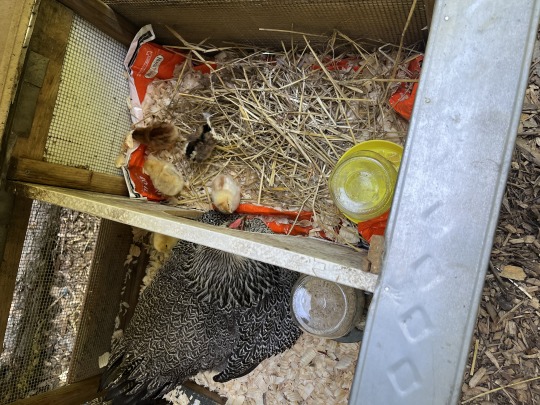#the chicken coop might go but i haven't ever played with them so i put one anyway
Text




i finished decorating my new family house, i'm so excited to finally play lmao ;_; i haven't played the sims in so long.
#ts4#interiors#exteriors#skill building items everywhere#the chicken coop might go but i haven't ever played with them so i put one anyway
11 notes
·
View notes
Text
Brace Yourself for Cuteness
June 13, 2024
Yes, we have chicks! Daisy went broody and we haven't had chicks since the pandemic and we already traveled a lot this spring - so we said - "why not, let's go for it." And off we went to the Tractor Supply store to pick some out. Five of them, $2.99 each. We brought them them home in a little box and kept them warm until dark. And then slipped them under the sleeping Daisy.
They were installed last night and so far she's taken to it like a duck to water! They are still locked in the brooder, I'll let them out tomorrow, but the brooder roof comes off so we peek in - CUTE! Little heads poking out everywhere from underneath her. Daisy is not pleased that we are peeking, but doesn't growl at us - just puffs up REALLY big. I think that she thinks the growling might scare the chicks?

Daisy puffed up when I opened the door to take a peek!
Some other fun things - the brooder (which is a converted dog house), is set up with two rooms - one smaller one as a nest box and a larger one for eating and playing. Faithful readers will remember that we built the brooder during the pandemic when Melly (of blessed memory) went broody. It was in April and it was cold out and Melly used the brooder as intended. Daisy, however, as faithful readers know, is a Brahma hen, which is to say she is huge.
From the Livestock Conservancy
In 1843, the Chinese signed a treaty that opened all their ports to trade. Once the ports were open, many previously never seen landrace chicken breeds became available – some from the northern part of the country and some from surrounding port cities. Included were extremely large chickens with feathered shanks and toes from the areas near Shanghai. The ships took all types of cargo, including these unique chickens for meat and eggs on their return trips. The surviving birds were often given exotic names and sold for profit at their ports of call. . . .
Early Brahma chickens were first shipped to America and then to England. This breed, together with the Cochin, fueled what became known as “Hen Fever” – a national obsession for poultry that hit both America and England around 1850.
Super digression, but really interesting, visit the website for more Brahma Chicken facts! Anyhoo - to get back to the brooder, chicks and Daisy. I think she's too big for the nest box room. Last night - during the transfer - we took her from the coop, where she was brooding on the floor by the people door - and put her in the nest box part of the brooder. The idea is that she goes to sleep wishing for chicks and wakes up with chicks! It worked, except that she roused herself just enough to move to the bigger room. I moved her back and she moved back. We left it at that. This morning she had the chicks herded into the nest box area, where she stood guard (well sat) in the entrance to the other side.

My idea now is to take out the divider and give them one big room. But that involves using my drill, which makes a lot of noise and might scare the babies so I'll save that for another day.
And here are some more pictures, because really - that's all anyone wants anyway!



Top: Guarding the entrance to the big room; bottom: chick escapes - well, the food is in the big room, so maybe she is letting them through so they can eat. The water is in the nest box room.

This may be the worst picture of me ever, but it shows the brooder, so there is that. The brooder roof is held on by pegs at the corners. I have wing nuts for the pegs, but I'm not sure why I though that was necessary. I would think it would be impossible for an animal to lift it off - it's hard enough with hands!
gtg, more chicken cuteness tomorrow! If you're in the area, come by and bliss out! But brace yourself. It's cuteness overload.
xoxoxox
Sarah, who can never have too many chickens.
ps. How do the other girls like this? They are excluded from the brooder area - which is the little brooder and a run. So, we don't know yet.
0 notes
Note
Hey, I'm not sure if I'm doing the right thing by asking this in question but would you say it's possible to have executive dysfunction while still being able to perform well in school? I don't have trouble with assignments but I've been wanting to read a book that sits in a cupboard 5 centimeters from me ever since October and haven't been able to force myself to open it. Could this be explained by EFD or should I look into something else? Or maybe I'm just lazy lol idk
It is absolutely possible. I excelled in high school while also committing myself to cross country and indoor/outdoor track sixs days a week for five years. I graduated with 15 varsity letters, over thirty medals at district and state meets, a 4.0 GPA, special or high honors every semester, 97th+ percentile on my SATs, 4s and 5s on all six AP exams, early acceptance to University with a merit scholarship, etc etc. I could go on but you get the point: you can have executive dysfunction and be successful in school.
[This got really long so I’m putting a readmore]
You might be wondering how I managed all those achievements if I have this disorder that I say I have. That’s normal. Most people hear “ADHD” and think “hyperactive child who can’t focus in school.” While that’s sometimes true, it’s far from an all-inclusive representation. The answer to my previous academic success, I’ve realized, is that I relied very heavily on externally-imposed structureLet me walk you through one of my days in high school, and you’ll see just how much of my routine was being enforced externally.
My alarm went off every day at 6:20am, and my dad made sure I was out of bed by 6:30 before he went to work. He usually made steel cut oats and left some for me. My mom always made sure there was enough food in the house so I could make my own lunch. I let the chickens out before leaving for school.I went to school for six hours of short (50 mins) classes of 18-25 students, where my teachers knew me (and my parents) and where phones and laptops were strictly forbidden. Notes were taken on paper only and homework assignments were due the next class, and everything was graded. Agendas were given out at the beginning of each year and we were expected to use them every day. Parents would be notified if behavioral or performance issues arose.After school I went to cross country or track practice where the captains led us through warm ups and then the coach told us what sort of training we were doing that day. They often timed us and recorded our progress over the season/years.After practice I went home, where my mom was starting dinner, and I did my homework that I had to do if I didn’t want to get a 0 and have a parent-teacher conference. I ate dinner, did the dishes because that was my chore, put the chickens away, worked on more homework, and then by 9:30pm my mom would be berating me to go to bed. I didn’t have a smartphone or a computer so it wasn’t possible for me to lay in bed staring at a screen all night. On weekends I cleaned the bathrooms and vacuumed the house because that was my job. Somewhere in there I also cleaned the chicken coop and attended to their food and water.Rinse and repeat.
If you look at that routine, you’ll see only two tasks that I truly did on my own: making my lunch and putting the chickens in/out. I didn’t want to go hungry at school, so I made myself food. And I frequently forgot to let the chickens out (and put them back in, but fortunately we had a solid run that kept predators out). Everything else that appears to be self-discipline was actually motivated by desire to avoid external punishment. And that punishment was very real to me because it was always immediate and harsh.Late for school? Detention. Phone in class? Confiscated, sometimes detention. Didn’t take notes/do the homework? 0s in class, parents notified, not allowed to participate in sports, absolutely grounded. Skipping practice? Not allowed to participate in meets, possibly kicked off the team, definitely in trouble with Mom and Dad. Don’t do chores? Time to get yelled at. Don’t take care of the chickens? They might die and then I’d be in huge trouble. Stay up too late? Yelled at.Everything I did was motivated not by desire to serve my own future, but desire to avoid immediate negative consequence. And I didn’t have hobbies for myself. I liked reading but I didn’t have much time for it. I didn’t play video games, surf social media, watch TV, go to the movies, or do anything purely for enjoyment’s sake.
When I went to college, all of that structure disappeared. I didn’t do a sport because I couldn’t compete at a Division I school (partially due to joint pain). My classes were large, long, and spaced out throughout the day, with weird breaks between them. Most professors didn’t care if we had phones or laptops, and often we actually needed them for class. Homeworks were due online, sometimes two weeks from when they were assigned. Grades were posted online. No warning for poor performance, no teacher giving me a talking to, no parent-teacher conference. Nobody told me when to do homework. Nobody told me when to eat (or to go grocery shopping). Nobody made sure I went to bed or got up in the morning. Nobody kept me from playing video games or scrolling social media all day.Nothing except my own desire to succeed held me accountable for managing my time and working hard in class, and like I said, I didn’t have that desire. People with ADHD don’t have that. Motivation and self-discipline stem primarily from aversion to negative long-term consequences, even more so than from desire to obtain positive outcomes. This is because negative emotion is felt more strongly and for a longer duration than positive emotion. It keeps neurotypical people on track. But people with ADHD lack the ability to “see” the long term consequences of not doing what we need to do, when it needs to be done. That’s why we are chronic procrastinators. We favor instant gratification over delayed gratification because we fail to integrate awareness of far-off consequences into our daily actions. In other words, people with ADHD struggle to orient their behavior towards their goals because it is difficult for our brains to recognize things in the future as real.
And so, because of all that stuff under the surface, I floundered and flailed. I didn’t know how to hold myself responsible and I didn’t know how to ask for help. And I was depressed. I was so depressed. And anxious. And losing weight because I wasn’t remembering to eat. And that made my body weak, it made my hands shake and it made my brain dull and foggy. I was being treated for depression and anxiety because nobody saw the other half of my history. The part where I crumbled the moment I had to hold myself up. It was missed entirely until I stumbled across information about rejection sensitive dysphoria, which is only experienced by people with ADHD, and I realized that rejection by my parents was what drove that fear of consequence that had been motivating me all my life. When I started looking at my history through the lens of inattentive ADHD, the picture became clear. It wasn’t laziness or depression that was stopping me, it was executive dysfunction.
So my point in all this is YES, it is 100% possible and is actually quite common for people with executive dysfunction to excel in structured academic environments. It’s especially normal for people whose ADHD is dominated by inattentive symptoms over hyperactive ones. One of the major reasons why many young women are not diagnosed until their late teens/early 20s is because they’re more often inattentive, not hyperactive, and so their executive dysfunction doesn’t become apparent until they enter an environment, such as university or a job, where they are expected to hold themselves entirely accountable for their own positive outcomes.
As for you personally, I can’t diagnose you. I can say that what you described is possibly a symptom of executive dysfunction, but I don’t know enough about you or your behavioral history to say whether or not you should consider seeking a professional opinion. If you are experiencing deficiencies in your self-discipline/motivation/memory/attention that are disrupting your quality of life, and if you can identify those as patterns throughout your life history, then you may have reason to see a psychologist. If your symptoms are confined to inconsequential/nonessential things like reading a book you’ve been wanting to read, I wouldn’t worry about it too much as I’m fairly certain that’s a normal experience for most neurotypical people.
Anyways thanks for coming to my TED talk, sorry for taking fifty million years to get to the point.
13 notes
·
View notes